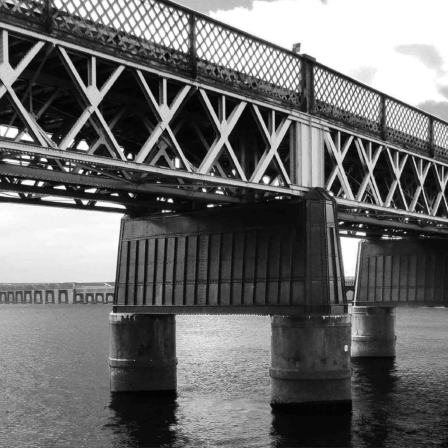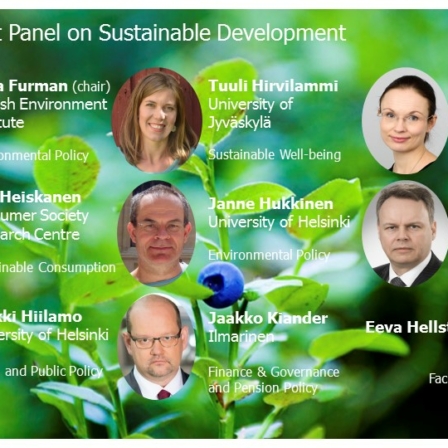What synergies do foresight and other future studies have with sustainable development? How do megatrends challenge sustainable development policies and how do SDGs (sustainable development goals) challenge work on the future? These were the questions that an international group of experts gathered to ponder on 8 June in Helsinki in a discussion arranged by Finland’s Expert Panel on Sustainable Development.
The discussion was part of an event which gathered international experts to discuss various burning topics for the future. The event entitled For the Next Generations was organised by the Committee for the Future of the Parliament of Finland, the Prime Minister’s Office, the National Foresight Network and the Finnish Innovation Fund Sitra.
Investing in the future
In a constantly changing world, sustainable development policies and activities need to evolve in time. Whereas sustainable development has previously often been perceived more as a policy area creating regulation, it is now more often regarded a possibility. But who should be the forerunner in this: politics, research or business? All, if you ask me, since these are all interdependent.
Finnish MP Harri Jaskari, who opened the session, stated that “when businesses start to take the lead, the world will change.” In Finland, for instance, 28 leading Finnish companies have joined forces to combat climate change in the Climate Leadership Council because they see the huge business potential it offers.
Sustainable development is an investment in the future. Therefore, it was interesting to see a novel approach to sustainability issues, based on concepts that are familiar to us from economics. The capital approach that Asaf Tzachor from the Ministry of Environmental Protection in Israel introduced to us, calls for a new role for governments as stewards of capital assets. In particular, this role requires long-term investments in society and a need to understand the interdependencies between human capital, economic capital, social capital and natural capital.
Changing how we do foresight
The relationship between sustainable development (SD) and strategic foresight is important, as Catarina Tully from the School of International Futures pointed out. The creation of the SDGs framework has been a huge global exercise and led to increased interest in strategic foresight. And, it has even changed what we need from the foresight field: new practices, new scale, participants, issues and methods. But what it has not changed, is the fact that strategic foresight needs to change the decision-making of today.
Ms Katriina Siivonen from Finland Futures Research Centre argued that sustainable development is already at the root of multi-disciplinary futures research, and that they have even grown together. Yet, in foresight work, which typically focuses on the future of certain organisations or institutions, responsible approaches are not necessarily present in daily activities. Thus, sustainable development challenges foresight and futures research as part of their own activities.
Disruptive thinking and transitions
We often tend to think that sustainable development policies are based on long-term relationships. Janne Hukkinen, a member of the Finnish Expert Panel on Sustainable Development, reminded us that SD is a contested concept pursued in a world full of complexities. He suggested that in addition to studying long-term relationships, we should in fact embrace short, disruptive, research based interventions that question the sustaining practices. This would mean, for example, challenging notions that any single viewpoint like GDP growth, bioenergy, resource efficiency or service economy as such is a good thing.
Later this year, Janne will be publishing an article in Evidence & Policy on a model of the temporal dynamics of knowledge brokerage in sustainable development. For all those keen on finding out more on this, have a look at the manuscript.
Tuuli Hirvilammi from the Finnish Expert Panel pointed out that researchers should always be able to question some of the hegemonic assumptions or even ideological beliefs that often guide decision-making. She argued that the legitimacy of sustainability transition does not require more knowledge as such. However, the paradigm shifts required call for closer interaction between academia and policy making. In particular, we need to re-examine the role of the economy in sustainable development.
Heikki Hiilamo from the Finnish Expert Panel argued that income inequality seems to have become one of the biggest problems of our time. On the basis of a scientific study conducted to study the balance between competing paradigms, he argued the case for why more egalitarian societies usually do better. This also calls for an urgent and serious reconsideration of the relationship between the economy and well-being.
Common features and challenges
The discussions during the afternoon reminded us all that neither sustainable development nor foresight or other future studies deal with easy and predictable issues, but rather with issues that are complex and unpredictable. The chair of the session and the expert panel Eeva Furman summarised the discussions with Eeva Hellström from Sitra, and identified 10 key points that represent the similar challenges of sustainable development and future studies.
- Long-term perspective
- Dealing with complex interdependent issues in a ”big world”
- Dealing with and enabling transformations
- Aiming for paradigm changes
- Involving disputed issues and contested contents (no “right answers”)
- Issues are rather abstract for ordinary people and decision-makers
- Need for knowledge brokering
- Require creativity
- Need to increasingly use participation and co-creative processes
- Struggle with connecting long-term thinking and short-term solutions.
I think we all agreed that countries, as well as companies, organisations and individuals that act wisely now, will be the ones to succeed in future. In the long term, it will just be far too expensive to NOT fully use the vast synergies between future studies and sustainable development.



Recommended